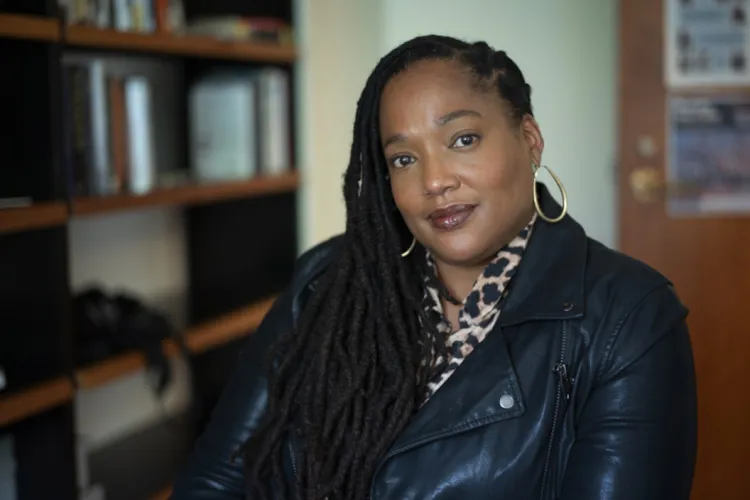Changing Perspectives: Q&A with Sociologist Nina Johnson

An assistant professor of sociology and a 2019–2020 Engaged Scholars Initiative Fellow, Nina Johnson researches the impacts of mass incarceration and public policy on Philadelphia neighborhoods. She talked with the Bulletin about her studies of race, class, and inequality, her role in the Black Studies Program, and who inspires her.
You’re a member of the Graterford Think Tank and a newly formed think tank at the State Correctional Institution in Chester, Pa. Why is this work on mass incarceration important?
In the United States, 2.2 million people are incarcerated—a 500% increase over the last 40 years. These numbers are not evenly distributed across the population. Though people of color are 37% of the U.S. population, they are 67% of the incarcerated population. Low-income African American men and women are more likely to be arrested, once arrested more likely to be convicted, and once convicted more likely to be given a harsher sentence. This program changes their perspectives.
We train faculty in a pedagogy that foregrounds peer-to-peer learning and facilitate workshops for new DAs in Philadelphia. Most of these prosecutors have never been inside a prison and have never spoken to nor heard the stories of the people on the other side of their case. Similarly, many voters and supporters of punitive carceral policy have no idea of the devastating impacts it has on communities and families. That is our work—to educate us all toward a reduction of suffering in the present and a better, more equitable, more humane future where we can all be free.
What do you mean when you talk about creativity as a strategy with your students?
My time as coordinator allowed me to think through the questions around experiential learning. We’ve had more and more students interested in going abroad and interested in learning about the global Black political community beyond the boundaries of nation state. They explore questions of culture and meaning-making around Blackness in its multiplicity of forms. Students like Brandon Ekweonu ’20, who presented his work “Hip Hop Influence: The Fluency of Hip Hop as a Language for Communicating Consciousness and History,” along with Taylor Tucker ’20, who looks at questions of childhood development with “Into the Masters’ Hands: The Carceral Captivity and Exploitation of Black Female Bodies in Schools and Beyond.” Those are just two examples of students who are researching Black folks in cities and Afrofuturism—they are looking at creativity as a strategy, and where they see themselves in the future.
Do your students ever change your views or surprise you?
My students challenge me all the time. What strikes me the most is the pace at which they work. I’m struck by their sense of urgency. They’re deeply committed to making a more just, fair world. Part of what I try to encourage them to do is to prioritize joy, take time to rest and reflect, think about how we can all work together and how they can best use their time, talent, and resources to create the world they envision.
Tell us about your upcoming book Black Privilege: The Paradox of Status and Stigma in the Lives of Black Elites.
Everyone who I interviewed for the book attended elite institutions, and they were often part of a very small community of Black students. They went on to high levels of income and occupational prestige, but they have complicated relationships with their own success, and with the elite institutions that educate and employ them, and they still navigate the isolation and the social distances within their own families because they were the ones who “made it.” Through my observations and interviews with them, I was able to uncover the impacts of the Brown v. Board ruling and other desegregation policies and programs at the level of interaction, within relationships, families, neighborhoods, and political communities.



